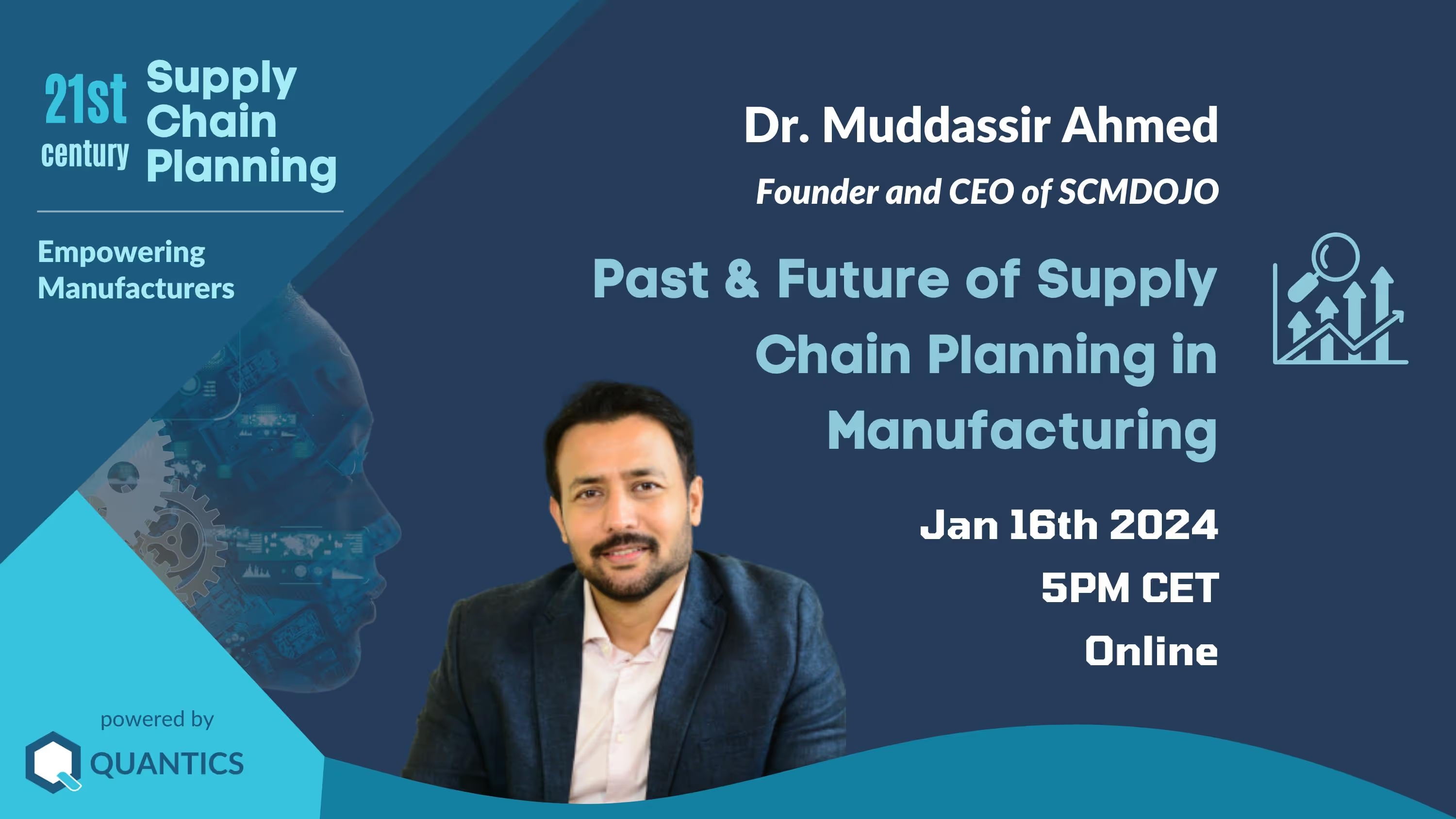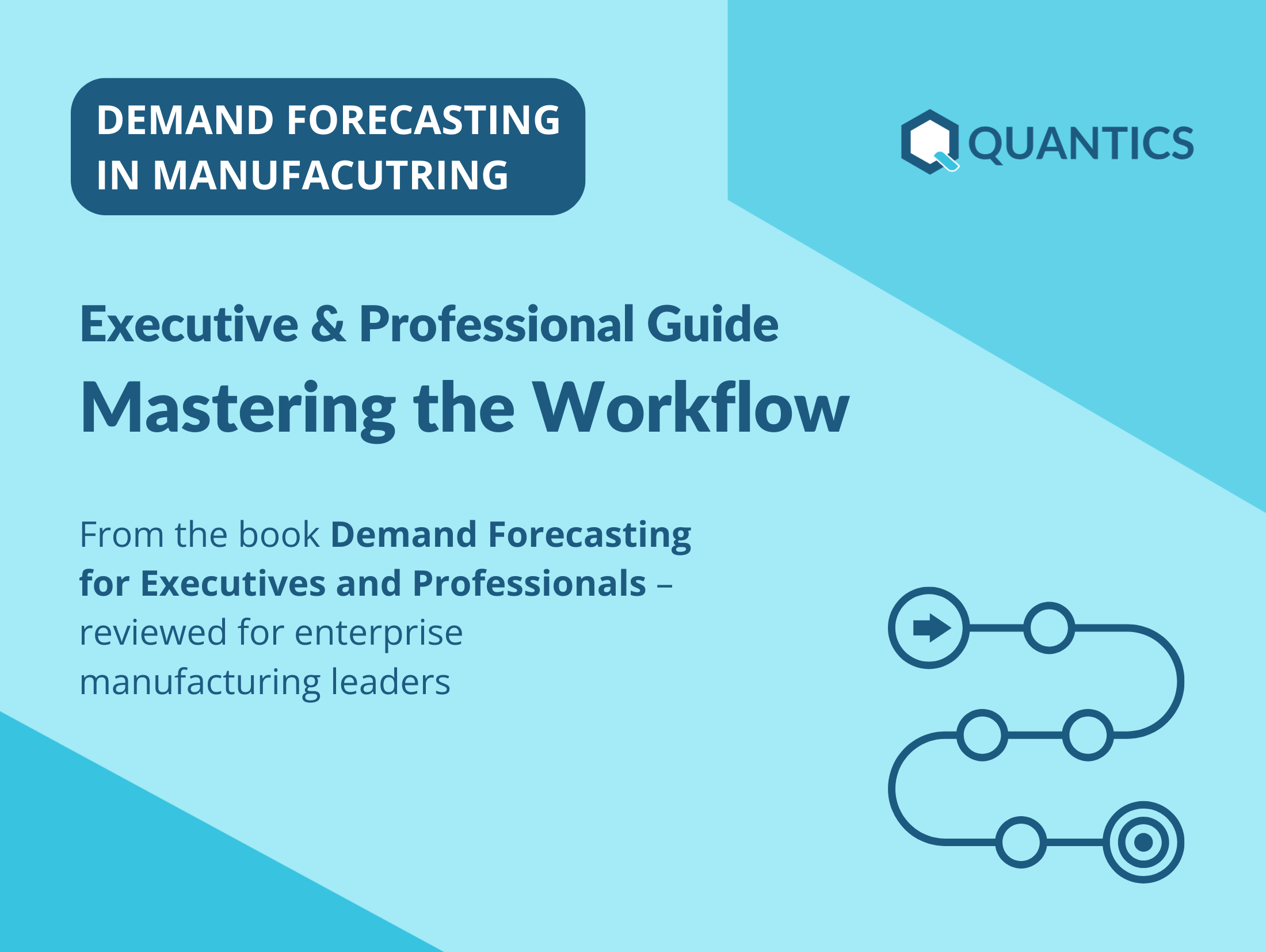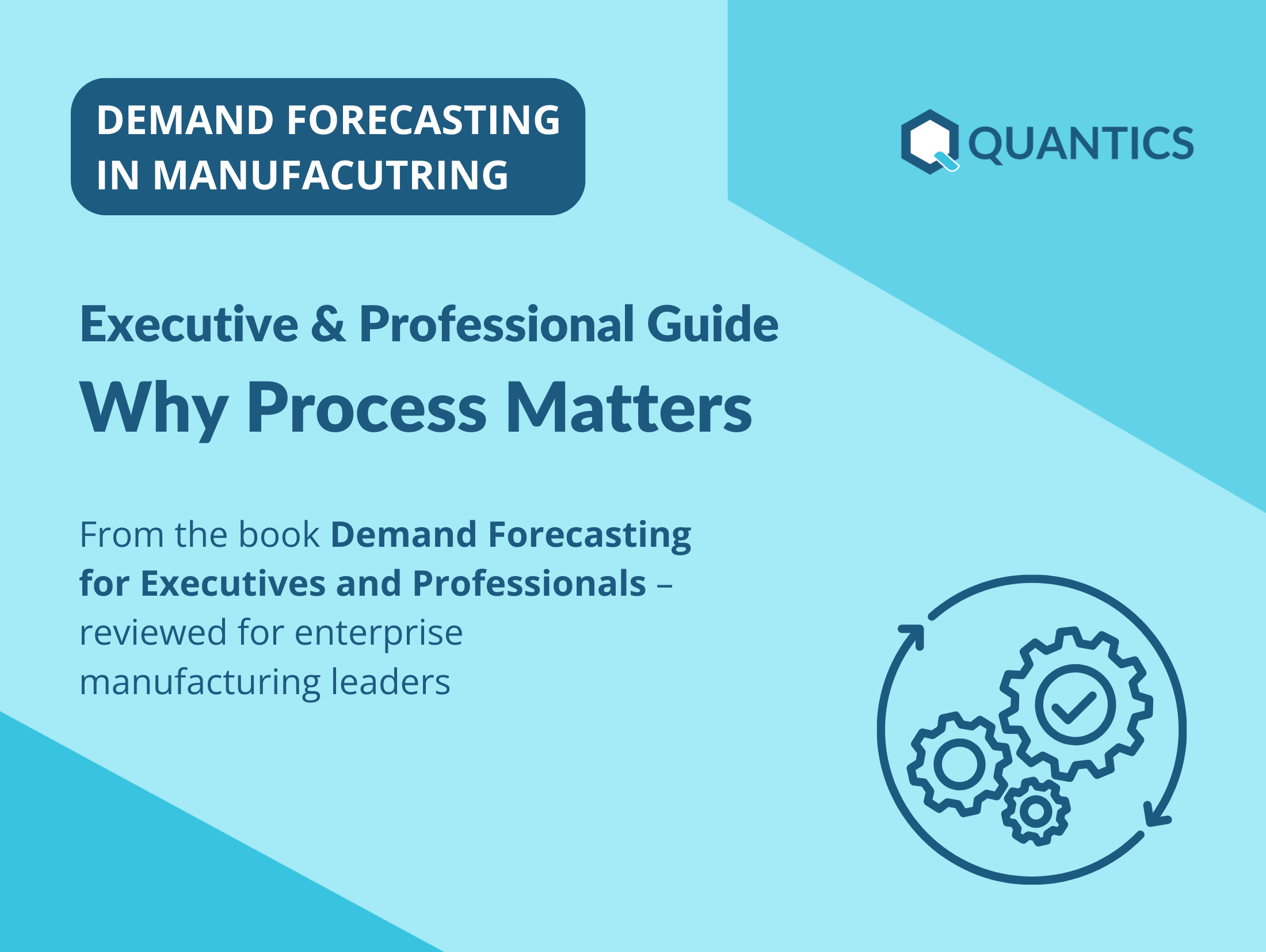Past & Future of Supply Chain Planning in Manufacturing
21st Century Supply Chain Planning: Empowering Manufacturers - Dr. Muddassir Ahmed - Past & Future SCP

The following is an excerpt from Quantics' webinar series "21st Century Supply Chain Planning: Empowering Manufacturers”. In this episode, we explore the evolution, challenges, and future prospects of supply chain planning through insights shared by industry expert Dr. Muddassir Ahmed, the Founder and CEO of SCMDOJO.
Remember, this is just a sneak peek! In the full episode we continue into the following additional topics:
- Boosting resilience and managing risks in supply chain planning amid recent global disruptions
- Supply chain planning as an aid to manufacturing sustainability goals & anticipated changes
- Unlocking the power of collaboration in supply chain networks: Which strategies to utilize
- How manufacturing companies can continually improve their supply chain planning processes
- The unsung heroes of supply chain planning
Let’s get started…
The Evolution of Supply Chain Planning and Key Milestones
In the dynamic landscape of manufacturing, supply chain planning stands as a cornerstone of operational efficiency and customer satisfaction. Over the years, this vital aspect of business management has undergone significant evolution, spurred by technological advancements, market trends, and global disruptions. To gain deeper insights into this evolution and its implications, we turn to industry expert Dr. Muddassir Ahmed, whose extensive experience sheds light on the journey of supply chain planning and its key milestones.
Dr. Ahmed begins by reflecting on his entry into the field in the early 2000s, where concepts like Enterprise Resource Planning (ERP) and Material Requirements Planning (MRP) were foundational. These systems provided a framework for managing resources, orders, and inventory, albeit with certain limitations. He recalls the challenges faced in understanding the logic of MRP and ERP, underscoring the rudimentary understanding prevalent at that time.
Dr. Ahmed highlights the transition from traditional material management to the holistic approach embodied by supply chain management. This period witnessed a paradigm shift in how businesses approached the coordination of activities from procurement to delivery.
Dr. Ahmed emphasizes the importance of integration and collaboration in modern supply chain planning. The advent of cloud technology has facilitated seamless communication and coordination between upstream and downstream partners. This integration has become even more crucial in the wake of global disruptions such as the COVID-19 pandemic, where visibility and agility are paramount.
One of the most significant trends in recent years has been the integration of artificial intelligence (AI) and machine learning (ML) into supply chain planning. Dr. Ahmed acknowledges the potential of these technologies in improving forecasting accuracy and optimizing operations. However, he cautions against over-reliance on AI without ensuring the quality and reliability of underlying data.
Despite technological advancements, Dr. Ahmed identifies a persistent challenge in understanding customer demand. He emphasizes the need for a nuanced approach to demand planning, distinguishing between forecasting and planning and incorporating various inputs such as sales, marketing, and economic factors.
As businesses navigate these complexities, they must leverage the lessons of the past to forge a more resilient and agile supply chain for the future.
Crucial Skills Needed by Supply Chain Professionals & Key Gaps Between Supply Chain Education and the Needs of Manufacturing Companies
Dr. Ahmed highlights several key issues facing supply chain professionals today. One major challenge is the diverse backgrounds from which individuals enter the field. Many professionals find themselves in supply chain roles not by choice but by circumstance, leading to significant knowledge gaps that must be addressed.
One common scenario Dr. Ahmed described is individuals transitioning into supply chain roles due to their proficiency in tools like Excel or data analysis, only to realize the complexity and depth of supply chain management requires a specialized skill set beyond common sense.
There are limitations of traditional education and certification programs in adequately preparing professionals for the dynamic challenges of modern supply chains. While certifications like CSCP or CPIM exist, they often provide only foundational knowledge and may not be accessible to all due to high costs.
Dr. Ahmed emphasizes the lack of readily available expertise for businesses seeking specialized guidance in areas such as technology adoption, supplier selection, or process optimization. Small to mid-sized companies, in particular, struggle to access affordable training and consultancy services.
To address these challenges, Dr. Ahmed introduces his initiative, SCMDOJO, which aims to democratize access to supply chain education and expertise. Through a subscription-based model, SCMDOJO offers comprehensive courses, best practices, and access to expert consultants at an affordable price point, making it accessible to a wider range of businesses.
Dr. Ahmed underscores the critical need for continuous learning and development in the supply chain profession, especially as technologies and practices evolve rapidly. By bridging the gap between traditional education and the practical needs of businesses, initiatives like SCMDOJO are paving the way for a more skilled and adaptable workforce in the supply chain industry.
Key Supply Chain Planning Challenges for Manufacturing Companies Today
While different manufacturing sectors may vary in their processes and specific requirements, the fundamental principles of supply chain management remain consistent. Dr. Ahmed highlights the universality of key performance indicators (KPIs) such as on-time delivery, inventory days on hand, and order-to-ship time across diverse manufacturing domains. According to him, the essence of supply chain planning lies not in the type of manufacturing, but in a deep understanding of manufacturing operations.
The role of knowledge and expertise in navigating supply chain complexities is pivotal. Dr. Ahmed underscores the significance of individuals who possess a profound understanding of manufacturing processes, asserting that they are better equipped to excel in supply chain roles. He emphasizes the importance of continuous learning and education in enhancing planning capabilities.
While technological advancements present opportunities for streamlining processes and enhancing efficiency, he suggests that a solid grasp of manufacturing fundamentals remains paramount. Integrating technology into supply chain planning endeavors requires not only technical proficiency, but also a nuanced understanding of manufacturing subtleties.
Enhancing Manufacturing Supply Chain Planning: Exploring the Role of AI, IoT, and Blockchain
One technology that often sparks curiosity is blockchain. However, Dr. Ahmed points out its limited applicability in supply chain planning. While it offers advantages in areas like financial transactions and traceability, its utility beyond these domains seems constrained. Dr. Ahmed emphasizes that pitching blockchain for planning purposes could be akin to selling a dubious product.
Instead, he gravitates towards other transformative technologies. Cloud computing emerged as a pivotal tool, promising improved integration upstream and downstream. Then there’s the evolving nature of database structures, particularly in the context of AI. This shift offers higher computational power, augmenting the capabilities of AI in making accurate predictions.
On the topic of IoT, while it excels in data collection from devices, its direct impact on planning appears limited. The focus, as noted, should be on leveraging IoT to enhance data quality rather than planning processes directly.
However, integrating these technologies into existing ERP systems presents a significant hurdle. The complexities involved in altering established systems and the challenges of handling diverse data sources must be emphasized. From treating data as time series to managing unstructured data, the barriers to seamless integration are evident.
Advanced technologies can revolutionize demand forecasting, streamline operations, and drive efficiency throughout the supply chain. However, the journey towards adoption requires a strategic approach, emphasizing data quality, system compatibility, and a clear understanding of technology's role in enhancing planning processes.
Successful forecasting goes beyond mere mathematical algorithms, delving into the cultural and organizational aspects of the process.
Enhancing Demand Forecasting for Optimal Business Performance
Demand forecasting plays a pivotal role in enabling businesses to anticipate market trends, optimize resources, and enhance overall operational efficiency.
Dr. Ahmed reflects on the challenges of employing advanced technologies like deep learning models in manufacturing data sets, pointing out the importance of understanding the limitations and robustness of such models, especially when dealing with bulk shipments. He highlights the need for continual improvement in demand forecasting methodologies, particularly in the context of evolving manufacturing landscapes.
Dr. Ahmed emphasizes that successful forecasting goes beyond mere mathematical algorithms, delving into the cultural and organizational aspects of the process. He quotes Warren Buffet, who once said, “Forecasts usually tell us more about the forecaster than of the future.”
Regarding the application of technology in demand forecasting, Dr. Ahmed outlined various tools and algorithms, ranging from basic time series forecasting to sophisticated machine learning models. Despite advancements, he expresses skepticism about the widespread effectiveness of AI in demand forecasting, noting the prevalence of human intervention in interpreting and utilizing forecast outputs.
He stresses the importance of focusing on the practical implications of forecasting accuracy rather than fixating solely on technical metrics. There is a need for organizations to bridge knowledge gaps within their teams, particularly regarding forecasting terminology and methodologies. Engaging cross-functional teams, including sales and supply chain management, is crucial for fostering a culture of continuous improvement in demand forecasting processes.

Want to learn more about this topic?
This is just a sneak peek into "Past & Future of Supply Chain Planning in Manufacturing” with Dr. Muddassir Ahmed, the Founder and CEO of SCMDOJO, on January 16th, 2024.
To watch the full episode, visit Quantics’ YouTube channel. As mentioned, in the full episode we continue into the following additional topics:
- Boosting resilience and managing risks in supply chain planning amid recent global disruptions
- Supply chain planning as an aid to manufacturing sustainability goals & anticipated changes
- Unlocking the power of collaboration in supply chain networks: Which strategies to utilize
- How manufacturing companies can continually improve their supply chain planning processes
- The unsung heroes of supply chain planning

Meet Our Expert: Dr. Muddassir Ahmed
Recognized as a leading figure in the field of supply chain and digitalization, Dr. Ahmed serves as the Founder and CEO of SCMDOJO, a prestigious platform committed to supply chain education, consulting, and services. With a focus on enabling businesses and individuals to achieve supply chain excellence, he is a sought after keynote speaker at numerous well-known supply chain events. Holding a doctorate from Lancaster University, he boasts over two decades of experience in various supply chain roles for prominent manufacturers. His expertise spans positions such as Demand Planner, Manufacturing Manager, Logistics Director, and Regional Planning and Operations Manager, showcasing his comprehensive understanding of the industry.
Start now
Start now
Learn how Quantics contains unique features that can optimally support your manufacturing businesses in unlocking the power of cutting-edge forecasting and supply chain planning.
Learn how Quantics contains unique features that can optimally support your manufacturing businesses in unlocking the power of cutting-edge forecasting and supply chain planning.

Frequently Asked Questions
Find answers to common questions about our solutions and how they benefit your operations.






